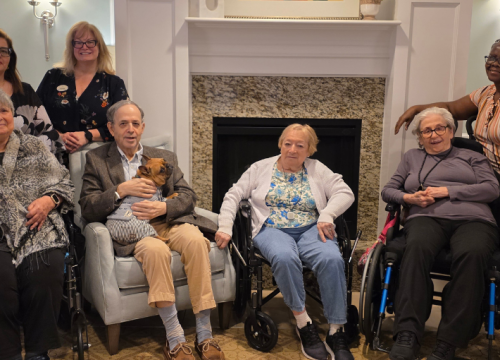Finding a Specialist
Managing Parkinson’s disease (PD) is a challenge for anyone who is touched by it. Doing it well may require you and your loved ones to take on a variety of important tasks, from adjusting work or retirement lifestyles to committing to an appropriate exercise regimen. However, no task is more important than finding the right doctor.
When symptoms first appear, for many, the first step is to speak to your family doctor or internist. If that doctor suspects PD, he or she may refer you to a general neurologist or a movement disorder specialist. The Parkinson’s Foundation strongly advises people with Parkinson’s to seek out a movement disorder specialist as the leader of their health care team. In some cases, for example, if you live far from an academic medical center or a specialist in private practice, the Parkinson’s Foundation recommends receiving most of your care with a knowledgeable general neurologist nearby, and then traveling a longer distance to see a specialist two to three times a year. In this article, we explain what you have to gain by working with a specialist and guide you step-by-step through the process of finding one.
Which Doctors Specialize in Parkinson’s Disease?
Movement Disorder Specialists
A Movement Disorder Specialist is a neurologist who has completed two years of extra training (a fellowship) in movement disorders, a subspecialty in neurology. With this level of experience, a movement disorders specialist will be more familiar with the range of available PD medications, how they work, and their possible side effects. A specialist is also more likely to discuss the role of clinical trials.
General Neurologists
Some neurologists treat many people with PD and may be knowledgeable about the disease, but most have diverse practices, of which PD represents only a small percent.
How do Parkinson’s Specialists Differ From General Practitioners?
Movement disorder specialists have more experience diagnosing PD because they have been trained to do so. They care for a large population of people with PD, giving them the experience and familiarity of available medications and up-to-date treatments.
Why Should You See a Specialist?
Movement disorder specialists are more likely to be aware of which healthcare professionals may be helpful with day-to-day challenges.
These professionals may include physical therapists, occupational therapists, speech therapists and nutritionists.
Many movement disorder specialists perform clinical or basic science research in addition to caring for patients, making them more likely to discuss the role and importance of clinical trials.
Recent research shows that people newly diagnosed with PD who went to a neurologist lived longer than those who saw a primary care provider — in fact, they were 20 percent less likely to have died after six years and 20 percent less likely to need placement in a skilled nursing facility (nursing home). After one year of follow up, they seemed less likely to have experienced injuries from falls — they were 14 percent less likely to have broken a hip (Willis, et. al., Neurology, 2011)
How to Find a Parkinson’s Specialist
- Call the Parkinson’s Foundation Helpline 1.800.4PD.INFO (473-4636) for a recommendation from our extensive database.
- Ask your primary care provider for a referral.
- If you do not live in an area that is near an academic medical center or a specialist in private practice, you may want to seek out a referral from a general neurologist, gerontologist or internist.
What to Expect From a First Neurology Appointment?
A movement disorder specialist will take a thorough medical history, family history and history of symptoms. They will also conduct a thorough physical and neurological exam.
Decisions about treatment should be collaborative between you and your Neurologist. Choose someone who treats you with respect, answers your questions and takes your opinions seriously. Beyond getting good medical advice, it is important for you to be comfortable talking to your doctor.
Allied Health Providers Should Also be Specialists
People living with PD benefit most from a comprehensive, team-based healthcare approach. The Parkinson’s Foundation promotes an allied health team approach in our Centers of Excellence network. Having a group of medically diverse experts effectively managing your PD symptoms can maximize your quality of life.
While some people find all of their specialists in one practice, in most cases, the person with PD will have to build a team.
Look for the following allied health providers who have expertise in treating people with Parkinson’s:
- Physical Therapist
- Speech-Language Pathologist
- Occupational Therapist
- Social Worker
- Nutritionist
- Neurosurgeon
- Neuropsychologist
Learn more about building your Parkinson’s care team by listening to our podcast (Parkinson.org/ Podcast) Substantial Matters: Life and Science of Parkinson’s podcast episode “Team Care for PD: Why It’s Important.” Find expert care in your area by calling the Parkinson’s Foundation Helpline at 1-800-4PD-INFO (473-4636).
TIPS: Prepare for your doctor's appointment with these questions:
- How do my other health conditions and medications affect my PD?
- If you are not available between visits, who may I communicate with and how?
- Are you aware of any new research and treatments?
- Are there lifestyle changes that can help my PD?
- Should I get a second opinion? This is common practice and a reputable doctor will not be offended by the question.
Related Materials
My Parent Has Parkinson's. What Does It Mean?
Managing "Off" Time in Parkinson's
Medications for Non-motor Symptoms
Related Blog Posts

Treating Sleep Apnea May Lower Parkinson’s Risk

10 Tips for Playing Pickleball to Stay Active with Parkinson’s
